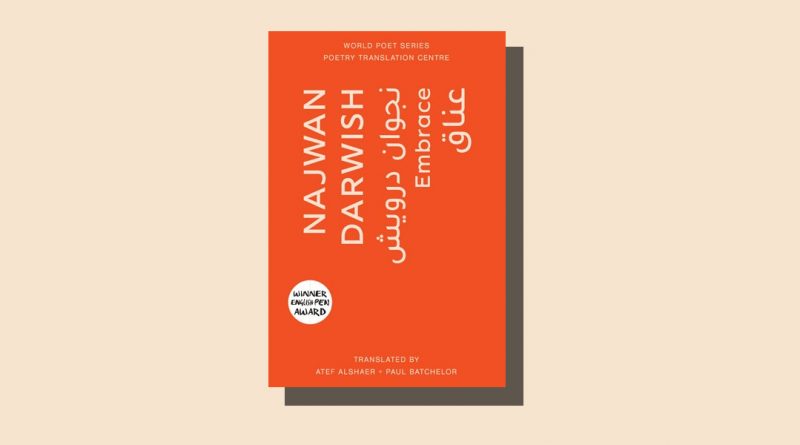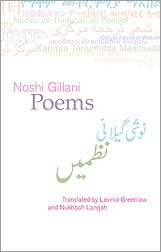Embrace by Najwan Darwish
-Reviewed by Helen Calcutt-
‘Confused, wet through,
My hands, torn reaching to embrace mountains’
This is the opening of the title poem of Najwan Darwish’s award-winning collection, translated by Atef Alshaer and Paul Batchelor. In the introduction, Alshaer talks about Darwish’s work as ‘compelling’ yet also ‘inexplicable’. Feeling, ‘at once immediate, honest, and somehow ‘incongruous’. Indeed, this collection is full of startling imagery, seeming discordant, perhaps because its often leaps out of nowhere and back into nothing. But the more you read, the more harmonious the imagery becomes – both within the structure of the poems to which it belongs, and to the interior landscape of the collection as a whole.
This entire book sings to itself, and to us, in a voice that is at once unrefined and precise; brimming with emotional intensity, yet so finely tuned. It would seem as though everything has been shaped on the basis that the emotion must be raw – but the poem excellent. And this translucent and utterly refreshing dedication to the art of exploring personal experience without self-pity, whilst at the same time sinking the reader deeper and deeper into the eyes and mind of the poet, is what makes ‘Embrace’ the poetic masterpiece that it is.
Alshaer speaks of the ‘glimmers of hope’ we often find in Arabic poetry. And there is hope indeed to be found in ‘Embrace’. This superb translation, while remaining true to Darwish’s anguish, is also true to his faith in the exquisite beauty of the world. Even as his own people lead him ‘towards the abyss’, there are ‘dew-wet meadows, slipping one after another’; ‘Man’ can grieve, but he is also ‘the sea, the mountain and the breeze./ He blooms in every love song’.
For all its hope, grief, and political distress, there’s a refreshing lack of self-awareness. The ego of the poet is barely there, with everything in place to serve the poem, and then us the reader, so that we might understand what lies at the heart of it. Even in moments of acute melancholia, there is no distracting self-pity. Each poem is like a rough sand-block, cut and carved and then inscribed with a surprising testimony – to childhood, the gates of Jerusalem, the art of poetry, what it is to be happy, to remember a friend, or to live under Israeli occupation:
You couldn’t believe how much I’d grown;
I couldn’t believe how deserted you were.
Who could believe
that his own hands and face
have become ruins put up for sale?‘To the Valley of the Cross’
This collection could be overtly political. But it balances the Palestinian condition of occupation and war with broader existential themes, especially the importance of individual thought and action. As touched on by Alshaer, Darwish’s poetry both inhabits the ‘historical injustices visited upon Palestine’ whilst at the same time transcending the Palestinian condition. His eye is fixed on the purpose of both protesting and preserving the human drama within his poetry and this energy of concentration brings the poems to a neutral space. Nothing is cried with despair or lamented. The political issues that he raises are raised within the fibres of the work, for the work’s sake. Selflessly, he has allowed the intense distress he feels to serve the condition of the poem: manifested within every fibre – and presented to us as both an alarmingly beautiful, and disturbing fact:
Mountains collapsing in my head,
dew-wet meadows, slipping one after another
even the sky –
the only one all people share –
is no longer my sky.‘Even the Sky’
This is an incredible feat from a poet whose subject is hugely dividing and divisive. I’m reminded of Ted Hughes’ introduction to Vasko Popa’s collected works (first published in 1969) where he talks about the poet’s ‘attempt’ to ‘record man’s awareness of what is being done to him, by his own institutions and by history, and to record along with the suffering their inner creative transcendence of it…’ Darwish is certainly documenting what is being done to him. But at the same time, nurturing a life-line outside of it. A way of speaking and being that exists beyond the walls of suffering.
Whilst this collection is something of a requiem for deep injustices, it is also something of a positive affirmation. As he states in the final poem of the collection (perhaps my favourite poem of the year):
We are here now…
…rain is falling
and our tea is about to end –
the poem as well.
I am a ghost and I know what I’m talking about.
Everything is ephemeral. Nothing lasts and therefore, nothing can be truly owned. Especially the ‘self’. While there isn’t an inch of Darwish-the-man within these poems, his poetic eloquence, skill, and integrity hums within each and every line, breath and syllable. And this is the Najwan Darwish who can never be diminished or reduced. ‘Ghosts gather to keep warm’ he says, ‘I am a ghost and I know what I’m talking about’. This is the collective Palestinian grief, the sublimely poetic yet desperately sad notion that, his and their existence has already begun to fade. But it’s also a description of the entire human grief – the single fate that binds us. And again, this existential reach towards a broader thematic plane lifts his work above and beyond his cultural and political roots. Lifts him beyond it, to a place he can never be touched.




